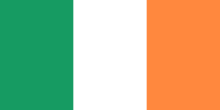
Belfast is the capital city and principal port of Northern Ireland, standing on the banks of the River Lagan and connected to the open sea through Belfast Lough and the North Channel. It is the second-largest city on the island of Ireland, with an estimated population of 348,005 in 2022, and a metropolitan area population of 671,559.

Derry, officially Londonderry, is the largest city in County Londonderry, the second-largest in Northern Ireland and the fifth-largest on the island of Ireland. The old walled city lies on the west bank of the River Foyle, which is spanned by two road bridges and one footbridge. The city now covers both banks.

Ireland, also known as the Republic of Ireland, is a country in north-western Europe consisting of 26 of the 32 counties of the island of Ireland. The capital and largest city is Dublin, on the eastern side of the island. Around 2.1 million of the country's population of 5.15 million people reside in the Greater Dublin Area. The sovereign state shares its only land border with Northern Ireland, which is part of the United Kingdom. It is otherwise surrounded by the Atlantic Ocean, with the Celtic Sea to the south, St George's Channel to the south-east and the Irish Sea to the east. It is a unitary, parliamentary republic. The legislature, the Oireachtas, consists of a lower house, Dáil Éireann; an upper house, Seanad Éireann; and an elected president who serves as the largely ceremonial head of state, but with some important powers and duties. The head of government is the Taoiseach, elected by the Dáil and appointed by the President, who appoints other government ministers.
The Real Irish Republican Army, or Real IRA (RIRA), was a dissident Irish republican paramilitary group that aimed to bring about a United Ireland. It was formed in 1997 following a split in the Provisional IRA by dissident members, who rejected the IRA's ceasefire that year. Like the Provisional IRA before it, the Real IRA saw itself as the only rightful successor to the original Irish Republican Army and styled itself as simply "the Irish Republican Army" in English or Óglaigh na hÉireann in Irish. It was an illegal organisation in the Republic of Ireland and designated a proscribed terrorist organisation in the United Kingdom and the United States.
Sinn Féin is an Irish republican and democratic socialist political party in both the Republic of Ireland and Northern Ireland.

The Troubles were an ethno-nationalist conflict in Northern Ireland that lasted for about 30 years from the late 1960s to 1998. Also known internationally as the Northern Ireland conflict, it is sometimes described as an "irregular war" or "low-level war". The conflict began in the late 1960s and is usually deemed to have ended with the Good Friday Agreement of 1998. Although the Troubles mostly took place in Northern Ireland, at times violence spilled over into parts of the Republic of Ireland, England, and mainland Europe.
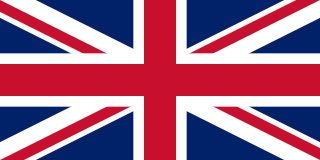
The United Kingdom of Great Britain and Northern Ireland, commonly known as the United Kingdom (UK) or Britain, is a country in Northwestern Europe, off the coast of the continental mainland. It comprises England, Scotland, Wales, and Northern Ireland. The UK includes the island of Great Britain, the north-eastern part of the island of Ireland, and most of the smaller islands within the British Isles. Northern Ireland shares a land border with the Republic of Ireland; otherwise, the United Kingdom is surrounded by the Atlantic Ocean, the North Sea, the English Channel, the Celtic Sea, and the Irish Sea. The total area of the United Kingdom is 94,354 square miles (244,376 km2), with an estimated population of 67,596,281 people in 2022.

William John Neeson is an actor from Northern Ireland. He has received several accolades, including nominations for an Academy Award, a BAFTA Award, three Golden Globe Awards, and two Tony Awards. In 2020, he was placed seventh on The Irish Times list of Ireland's 50 Greatest Film Actors. Neeson was appointed Officer of the Order of the British Empire (OBE) in 2000.

Ireland is an island in the North Atlantic Ocean, in north-western Europe. It is separated from Great Britain to its east by the North Channel, the Irish Sea, and St George's Channel. Ireland is the second-largest island of the British Isles, the third-largest in Europe, and the twentieth-largest in the world. Geopolitically, the island is divided between the Republic of Ireland, a sovereign state covering five-sixths of the island, and Northern Ireland, which is part of the United Kingdom. As of 2022, the population of the entire island is just over 7 million, with 5.1 million living in the Republic of Ireland and 1.9 million in Northern Ireland, ranking it the second-most populous island in Europe after Great Britain.
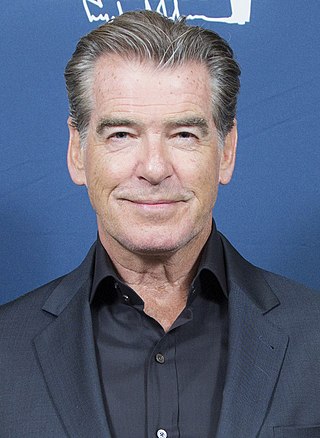
Pierce Brendan Brosnan is an Irish actor and film producer. He was the fifth actor to play the fictional secret agent James Bond in the James Bond film series, after Sean Connery, George Lazenby (1969), Roger Moore (1973−1985), and Timothy Dalton (1987−1989), starring in four films from 1995 to 2002 and in multiple video games, such as GoldenEye 007.

The Gaelic Athletic Association is an Irish international amateur sporting and cultural organisation, focused primarily on promoting indigenous Gaelic games and pastimes, which include the traditional Irish sports of hurling, camogie, Gaelic football, Gaelic handball, and rounders. The association also promotes Irish music and dance, as well as the Irish language and it also promotes environmental stewardship through its Green Clubs initiative.
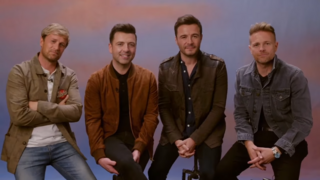
Westlife are an Irish pop group formed in Dublin in 1998. The group consists of members Shane Filan, Mark Feehily, Kian Egan, and Nicky Byrne. Brian McFadden was a member before leaving in 2004. The group disbanded in 2012 after 14 years and later reunited in 2018.
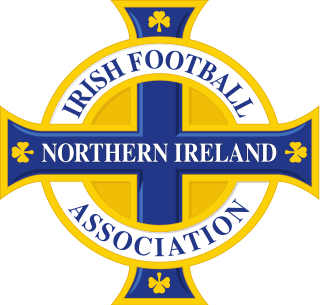
The Northern Ireland national football team represents Northern Ireland in men's international association football. From 1882 to 1950, all of Ireland was represented by a single side, the Ireland national football team, organised by the Irish Football Association (IFA). In 1921, the jurisdiction of the IFA was reduced to Northern Ireland following the secession of clubs in the soon-to-be Irish Free State, although its team remained the national team for all of Ireland until 1950, and used the name Ireland until the 1970s. The Football Association of Ireland (FAI) organises the separate Republic of Ireland national football team.

Cillian Murphy is an Irish actor. He made his professional debut in Enda Walsh's 1996 play Disco Pigs, a role he later reprised in the 2001 screen adaptation. His early film credits include the horror film 28 Days Later (2002), the dark comedy Intermission (2003), the thriller Red Eye (2005), the Irish war drama The Wind That Shakes the Barley (2006), and the science fiction thriller Sunshine (2007). He played a transgender Irish woman in the comedy-drama Breakfast on Pluto (2005), which earned him a Golden Globe Award nomination.

The Republic of Ireland national football team represents the Republic of Ireland in men's international football. It is governed by the Football Association of Ireland (FAI).
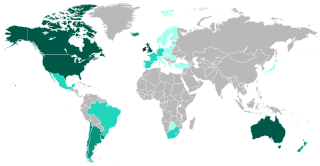
Irish people are an ethnic group and nation native to the island of Ireland, who share a common ancestry, history and culture. There have been humans in Ireland for about 33,000 years, and it has been continually inhabited for more than 10,000 years. For most of Ireland's recorded history, the Irish have been primarily a Gaelic people. From the 9th century, small numbers of Vikings settled in Ireland, becoming the Norse-Gaels. Anglo-Normans also conquered parts of Ireland in the 12th century, while England's 16th/17th century conquest and colonisation of Ireland brought many English and Lowland Scots to parts of the island, especially the north. Today, Ireland is made up of the Republic of Ireland and Northern Ireland. The people of Northern Ireland hold various national identities including British, Irish, Northern Irish or some combination thereof.
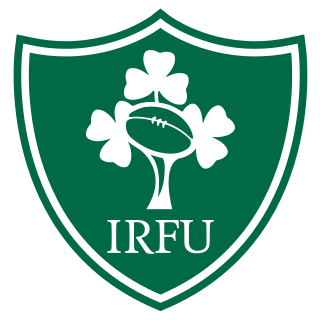
The Ireland national rugby union team is the men's representative national team for the island of Ireland in rugby union. The team represents both the Republic of Ireland and Northern Ireland. Ireland competes in the annual Six Nations Championship and in the Rugby World Cup. Ireland is one of the four unions that make up the British & Irish Lions – players eligible to play for Ireland are also eligible for the Lions.
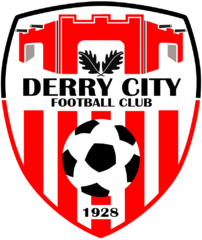
Derry City Football Club is a professional football club based in Derry, Northern Ireland. They play in the League of Ireland Premier Division, the top tier of league football in the Republic of Ireland, and are the League of Ireland's only participant from Northern Ireland. The club's home ground is the Brandywell Stadium and the players wear red and white striped shirts from which their nickname, the Candystripes, derives. The club are also known as the Red and White Army, Derry or City.
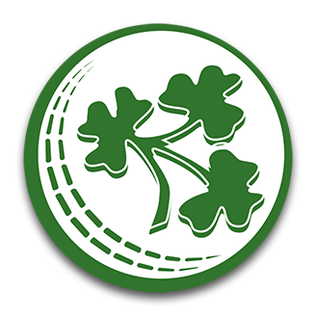
The Ireland men's cricket team represents all of Ireland in international cricket. The Irish Cricket Union, operating under the brand Cricket Ireland, is the sport's governing body in Ireland, and they organise the international team. The team have a number of home grounds, including Malahide in County Dublin, Stormont, Belfast, Bready in the north-west and Clontarf in Dublin city. A further ground is planned for the National Sports Campus in Abbotstown, Dublin for 2030. Due to the short season allowed by the Irish climate, and lack of large scale facilities, Ireland also occasionally play 'home matches' in venues in England and further abroad.

The national flag of Ireland, frequently referred to in Ireland as 'the tricolour' and elsewhere as the Irish tricolour is a vertical tricolour of green, white and orange. The proportions of the flag are 1:2.
